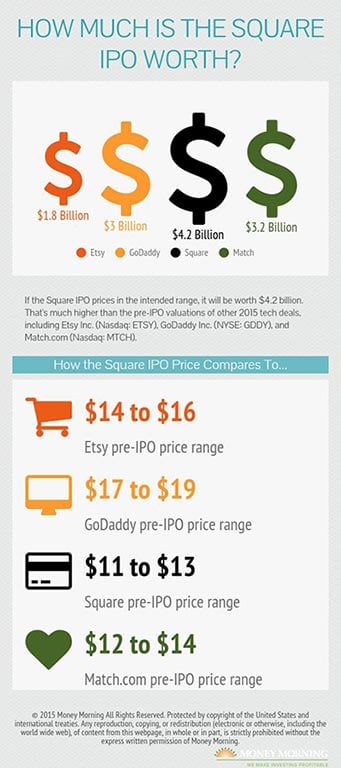Editor's Note: We will be providing coverage of the Square IPO through the stock's first day of trading. Check back for updates.
The Square IPO will price this Wednesday, Nov. 18. The deal is one of the most anticipated tech IPOs of the year. The company has also announced it will list on the New York Stock Exchange with the ticker "SQ." Square plans to raise up to $351 million by selling 27 million shares for $11 to $13 each.
With the company hitting the market this week, investors are wondering if investing in Square stock is a smart decision.
After the pricing, the Square IPO valuation will be roughly $4.2 billion. Square Inc. (NYSE: SQ) stock starts trading on Thursday.
Part of the reason for the huge valuation is its rapidly growing industry. The mobile payment industry is expected to reach $142 billion in volume by 2019, according to a report from research firm Forrester. And now, many investors view SQ stock as a long-term investment.
But for those looking to buy Square stock, these are the two biggest factors that will affect the Square share price after the IPO...
Square Inc. (NYSE: SQ) Isn't Profitable
Some investors believe Square's innovative payment technology makes SQ stock a good investment. Others view CEO Jack Dorsey's dual leadership of both Square and Twitter Inc. (NYSE:TWTR) as a hindrance to future profitability.
In fact, the company openly admitted it may never turn a profit. It posted $154.1 million in net losses in 2014 and $77.6 million during the first half of 2015.
"Our business has generated net losses, and we intend to continue to invest substantially in our business," the Square IPO filing said. "Thus, we may not achieve or maintain profitability."
Jack Dorsey: CEO of Square (NYSE: SQ) and Twitter
The Square IPO filing was very upfront about the challenges facing the company.
Square acknowledged that Jack Dorsey's dual roles at Square and Twitter Inc. (NYSE: TWTR) could cause conflict. "This may at times adversely affect [Dorsey's] ability to devote time, attention, and effort to Square," the Square IPO filing stated.
You see, Dorsey took over as CEO of Twitter on Oct. 2 during a pivotal and turbulent time. Twitter suffers from slowing user growth and stiff competition for advertisers' money from rivals like Facebook Inc. (Nasdaq: FB).
If Twitter was as strong as Facebook in terms of user growth and revenue generation, there would be less worry about Dorsey handling both roles effectively. Since he has to completely turn Twitter around, however, that's where the conflict arises.
So how is an unprofitable company like Square valued at $4.2 billion? It's because the company is fueled by speculation...
[mmpazkzone name="in-story" network="9794" site="307044" id="137008" type="4"]
The Square IPO Valuation Runs with the "Unicorns"
The inflated Square IPO valuation puts the company among the "unicorns" - Silicon Valley's term for tech startups worth $1 billion or more. Many of these unicorns are companies with valuations they can never realistically live up to.
That's because they're built on hype rather than growth figures like sales, revenue, and profits.
The only way unicorns can keep their valuations from getting slashed is by never actually going public.
After the company filed with the U.S. Securities and Exchange Commission to go public, the Square IPO valuation became $4.2 billion. That's significantly lower than the $6 billion valuation it received during its latest round of funding.
What If I Want to Buy Square Stock?
 Following the deal, Square will command a $4.2 billion valuation. Although that's much lower than the $6 billion valuation it received during its last round of funding, it's still higher than other recent tech IPOs. The Square IPO valuation beats Etsy Inc.'s (Nasdaq: ETSY) $1.8 billion and GoDaddy Inc.'s (NYSE: GDDY) $3 billion.
Following the deal, Square will command a $4.2 billion valuation. Although that's much lower than the $6 billion valuation it received during its last round of funding, it's still higher than other recent tech IPOs. The Square IPO valuation beats Etsy Inc.'s (Nasdaq: ETSY) $1.8 billion and GoDaddy Inc.'s (NYSE: GDDY) $3 billion.
The biggest reason why you shouldn't buy Square stock is because these tech deals are often fueled by hype rather than facts. Many investors dump money into unprofitable firms like Square without so much as glancing at the financials.
"Too many investors hear of a 'hot IPO' and try to get in on the action without doing any homework at all," said Money Morning Defense & Tech Specialist Michael A. Robinson. "That's a recipe for a hefty loss."
A perfect example is the Etsy IPO. The online marketplace for handmade goods went public on April 16 and raised $267 million. ETSY stock popped 87.5% on its first day and was one of the most successful tech IPOs of the year.
Since then, the stock has cratered 70.7%. It's considered one of the worst IPOs of 2015.
The IPO market in general is dangerous for retail investors. That's because IPOs only benefit institutional investors willing to buy thousands of shares of a stock before it debuts. These Wall Street "VIPs" bank triple-digit profits on the first day of trading, which teases retail investors into thinking they can do the same.
But the stock price becomes inflated by the time we're able to buy into the company. When the price settles down after the initial frenzy, retail investors who got in late are looking at a loss. This disadvantage can cause huge losses for traders like us who aren't in the Wall Street VIP club.
We will be providing coverage of the Square IPO leading up to its first day of trading. Follow us on Twitter for all of the biggest news updates - @moneymorning.


